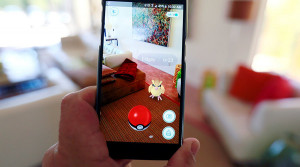
But while many before could only speculate as to the reason the US State Department may have been interested in developing such a game, it appears now there is at least a partial answer.
AFP would report in their article, “Pokemon Go a campaign weapon for presidential candidates,” that:
The global phenomenon Pokemon Go has made its way onto the US presidential campaign trail with the staff of both major candidates appealing to users of the smartphone game to catch voters.
AFP would also report (emphasis added):
Clinton staffers have since been cruising the streets looking for Pokemon hunters, hoping to divert their attention for the few minutes it takes to register to vote.
At a recent event in Ohio, the Democratic campaign encouraged players to come to its “lure module” — a feature that brings more Pokemon to a given location — to “get free Pokemon” and “learn more about Sec. Hillary Clinton!”
Quite literally then, the game is being used to lure people to physical locations through the promise of virtual payments. Once there they are subjected to political campaigning. One could imagine how this could be further expanded upon to manipulate people to an even greater degree.
AFP would also report something perhaps a bit more curious – that former US Secretary of State Hillary Clinton alleged that she didn’t “know who created ’Pokemon Go.’”
Clinton Was Secretary of State When Google-Niantic-State Department Began Collaboration
Niantic is headed by John Hanke, a former employee of both Google and before that, the US State Department.
He specifically worked on Google Maps and Google Earth, and did so during the opening phases of the “Arab Spring” in 2011 when Google Maps and Google Earth were manipulating location names in real-time in cooperation with the US State Department and US-backed protesters and militant groups on the ground in Libya and Syria.
It was also revealed that at this time, former US State Department employee Jared Cohen, then employed by Google, approached Secretary of State Hillary Clinton with a proposal of how to use location-based application to assist in the overthrow of the Syrian government.
The UK Independent in its article, “Google planned to help Syrian rebels bring down Assad regime, leaked Hillary Clinton emails claim,” would report that:
An interactive tool created by Google was designed to encourage Syrian rebels and help bring down the Assad regime, Hillary Clinton’s leaked emails have reportedly revealed.
By tracking and mapping defections within the Syrian leadership, it was reportedly designed to encourage more people to defect and ‘give confidence’ to the rebel opposition.
The article would continue:
The email detailing Google’s defection tracker purportedly came from Jared Cohen, a Clinton advisor until 2010 and now-President of Jigsaw, formerly known as Google Ideas, the company’s New York-based policy think tank.
In a July 2012 email to members of Clinton’s team, which the WikiLeaks release alleges was later forwarded to the Secretary of State herself, Cohen reportedly said: “My team is planning to launch a tool on Sunday that will publicly track and map the defections in Syria and which parts of the government they are coming from.”
Cohen would conclude:
“Our logic behind this is that while many people are tracking the atrocities, nobody is visually representing and mapping the defections, which we believe are important in encouraging more to defect and giving confidence to the opposition.”
Interactive tracking applications used to overthrow a sovereign elected government, giving way to interactive, location-based augmented reality applications used to manipulate voters to put people into government, seems like a natural, logical progression.
For Hillary Clinton to claim not to know how this application was developed, under her tenure at the US State Department, indicates that she is either dishonest or ignorant – but either way – unfit for the presidency.
The degree to which technology is being used to reach into the personal lives of the general public and manipulate them toward the ends of special interests is becoming increasingly disturbing and pervasive. Worst of all, despite incremental admissions as to who created Pokemon Go and to what end, the general public appears inoculated from suspicion with readily dispensed catch phrases like “don’t be paranoid,” and “that’s just a conspiracy theory.”
While big-tech and big-government colluding together to manipulate global populations is most certainly a conspiracy, it is by no means a “theory.” It is now demonstrable fact reported on by AFP itself.
One should also wonder what is next for location-based applications wielded by combines of government tech-business interests. Could it be augmenting staged rallies with “extra” attendees searching for “free Pokemon” to help draw in larger segments of the population who are otherwise disinterested in politics, no less politics driven by special interests from abroad?
Tony Cartalucci, Bangkok-based geopolitical researcher and writer, especially for the online magazine“New Eastern Outlook”.
